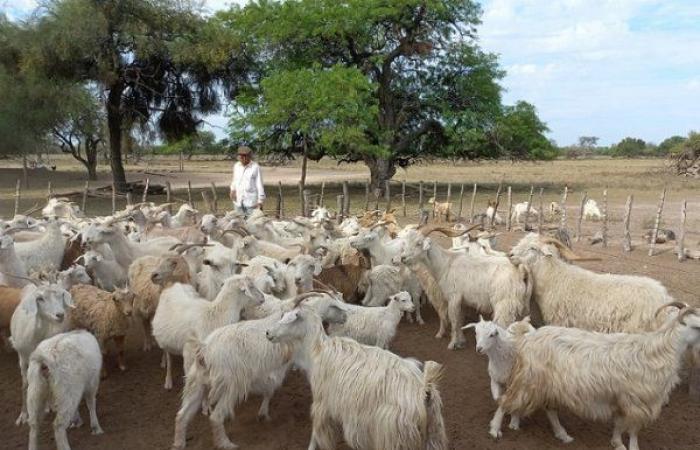A study will help protect the Chaco’s native goat genetic resource
The Angora goats of the Chaco are a native breed that has been little studied and has no official registration. A student from the UNNE Veterinary Faculty is carrying out characterization work to protect the genetic heritage of this local breed.
The student of the Faculty of Veterinary Sciences of the National University of the Northeast (UNNE), Santiago Ezequiel Martínez, carries out a project to protect the genetic heritage of Angora Goats in the central region of the province of Chaco. The project is carried out thanks to a Scholarship to Stimulate Scientific Vocations (EVC-CIN).
This widely distributed but little studied goat breed represents a genetic resource that could be lost if measures are not taken to conserve it. Despite its importance for the food sovereignty of the population of the Department of 25 de Mayo and a large part of the American Chaco, to date it has not been officially registered in the FAO database (DAD-IS), which leaves it unprotected and susceptible to crossbreeding with exotic breeds, putting its genetic purity at risk.
The project, titled “Characterization of Chaco Angora goat systems in the central region of the Chaco province”, seeks to collect fundamental information about this Creole breed. Under the direction of Dr. Juan Cappello Villada and the co-direction of Dr. Emilse Tejerina, both research professors at the UNNE Faculty of Veterinary Sciences, Martínez embarked on field work based on a qualitative data survey.
The characterization of the environment, one of the pillars of the study, will focus on the common management practices of producers, the sociocultural role of goats and their importance for the sustainability of the local population. This will allow us to understand the peculiarities and specific needs of this production system, which will be key to providing advice on good livestock practices without undermining the producers’ own culture.
In addition, a genetic and phenotypic characterization of the animals will be carried out. The first will be carried out in the laboratory using body tissue samples, which will allow obtaining information about the genes of the breed and its interaction with the environment. On the other hand, phenotypic characterization will focus on observable physical and behavioral characteristics.
To collect the necessary data, Martínez will carry out a sampling through surveys of producers, covering aspects such as the characteristics of the productive units, facilities and implements used, productive systems, sanitary and productive management of the goat herd, marketing chain and agricultural extension services. .
This pioneering research will not only provide valuable insights into an understudied local genetic resource, but will also lay the foundation for its official international recognition and inclusion in the FAO database.
The work will allow the dissemination of the characteristics of the production systems that, although known by producers, have no publications on them, and which have various particular characteristics. “It will expand the range of possibilities for intervention to improve the quality of life of families and good livestock practices, while promoting the conservation of a local breed known in the territory, but not academically,” said Santiago Martínez.
The information obtained is a survey that will serve as input for advising producers on good livestock practices, without these overlapping with the culture that defines them, “this amalgamation being essential so that the experiences can be applied solidly over time and be acquired and carried out by livestock stakeholders,” said Dr. Capello Villada.






